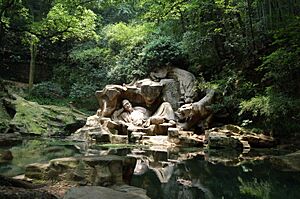Ji Gong facts for kids
Quick facts for kids Ji Gong |
|
|---|---|
| 濟公 | |

Tiger spring, the burial place of monk Jigong
|
|
| Religion | Chan Buddhism |
| Temple | Lingyin Temple |
| Other names | Chan Master Daoji |
| Monastic name | Daoji |
| Personal | |
| Home town | Tiantai County, Taizhou, Zhejiang, Southern Song |
| Born | Li Xiuyuan 22 December 1130 Tiantai County, Taizhou, Zhejiang, Southern Song |
| Died | 16 May 1209 (aged 78) Jingci Temple, Hangzhou, Southern Song |
| Parents |
|
| Senior posting | |
| Period in office | Southern Song |
| Religious career | |
| Teacher | Huiyuan |
| Ji Gong | |||||||||||||||||||
|---|---|---|---|---|---|---|---|---|---|---|---|---|---|---|---|---|---|---|---|
| Traditional Chinese | 濟公 | ||||||||||||||||||
|
|||||||||||||||||||
| Chan Master Daoji | |||||||||||||||||||
| Traditional Chinese | 道濟禪師 | ||||||||||||||||||
|
|||||||||||||||||||
| Li Xiuyuan | |||||||||||||||||||
| Traditional Chinese | 李修緣 | ||||||||||||||||||
|
|||||||||||||||||||
Ji Gong (Chinese: 濟公), also known as Daoji (Chinese: 道濟), was a famous Buddhist monk. He lived in China during the Southern Song dynasty (1130–1209). People believed he had special powers. He used these powers to help the poor and fight against unfairness.
Ji Gong was also known for his unusual and free-spirited ways. He did not always follow strict monastic rules. Even so, he became a legend in Chinese culture. Many people still see him as a helpful figure.
Contents
The Life of Ji Gong
Ji Gong was born Li Xiuyuan in 1130 CE. His parents were Li Maochun, a former military advisor, and Lady Wang. When he was 18, both his parents passed away. Li then went to Hangzhou and became a monk. He joined the Lingyin Temple, which was a Chan (Zen) Buddhist temple.
Becoming a Monk
His teacher was a wise master named Huiyuan. Li was given the monastic name Dàojì. This name means "Helper on the Way." However, Daoji was not like other monks. He often ate meat and drank wine, which was against the rules. His robes were usually torn and dirty from his travels.
Helping Others
Despite his unusual habits, Daoji was very kindhearted. He was always ready to help ordinary people. He would often treat the sick and stand up for what was right. The other monks at the temple were confused by his behavior. Eventually, they asked Daoji to leave the monastery.
After leaving, Daoji continued to roam the streets. He helped people wherever he could. His kindness and strange ways made him famous.
Ji Gong's Special Powers
According to stories, Daoji gained special powers through his Buddhist practices. Many people saw his kind and helpful nature. They began to believe he was more than just a monk. Some thought he was a bodhisattva, a being who helps others reach enlightenment. Others believed he was an arhat, a holy person who has reached a high level of understanding.
The Dragon Subduing Arhat
People widely recognized him as the Dragon Subduing Arhat. This is one of the Eighteen Arhats, who are special protectors in Buddhism. Later, he became known as Jìgōng. This name means "the Honorable Helper." It came from his monastic name, Daoji.
Later Life and Legacy
Toward the end of his life, Ji Gong stayed at Jingci Temple. He passed away on May 16, 1209, when he was about 79 years old.
A Revered Figure
Over time, Ji Gong became a respected figure in different beliefs. Taoism, another Chinese religion, began to honor him as a deity. Chinese Buddhist groups also recognized his compassionate work. He became an important part of Chinese Buddhism. Ji Gong even appears in many classic kōans, which are stories used in Zen Buddhism to help people think deeply.
Modern Influence
Since the late 1800s, some people in China have claimed to receive messages from Ji Gong. These messages came through a practice called Fuji, or "spirit writing." These messages often encouraged people to do good deeds. They led to more people honoring Ji Gong. His messages also helped start groups like the Benevolent Relief Society. This group later helped create the Red Cross Society of China.
Today, some Buddhist groups, like the Tung Cheng Yuen Buddhist Association in Hong Kong, worship Ji Gong. He is also part of the deities in Yiguandao, another Chinese religion.
How Ji Gong is Shown
Ji Gong is usually shown with a big smile. He wears torn monastic robes and large bead necklaces. He often carries a bottle of wine in one hand and a fan in the other. He wears a hat with the Chinese character Fo (佛), which means "Buddha." Sometimes, he is also shown holding his shoes. Because of his happy and carefree nature, he is rarely seen with a serious face.
 | Georgia Louise Harris Brown |
 | Julian Abele |
 | Norma Merrick Sklarek |
 | William Sidney Pittman |

